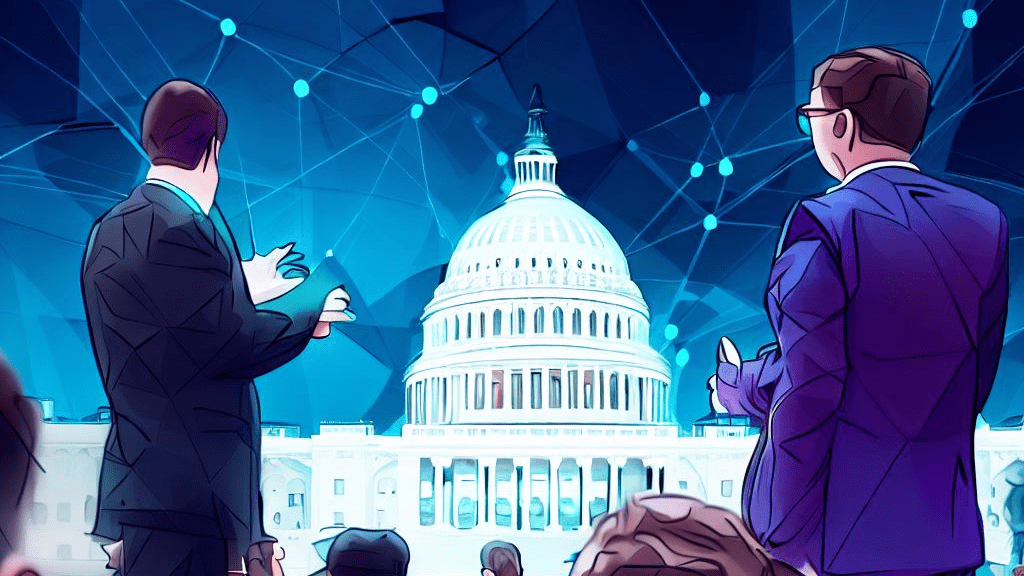
Cryptocurrency Industry Advocates for Regulatory Clarity to Foster Innovation and Economic Growth
The cryptocurrency industry is making its voice heard on Capitol Hill, urging Congress to establish clear and supportive regulations that can facilitate growth, innovation, and job creation within the sector. This push is spearheaded by Coinbase CEO Brian Armstrong and is part of the “Stand with Crypto” movement. The movement’s message is clear: without crypto-friendly regulations, America may witness an exodus of jobs and innovation to overseas markets.
In this crucial update for the cryptocurrency industry and the U.S. economy, we delve into the key players, their motivations, and the potential outcomes of this ongoing regulatory battle.
The Gathering of Crypto Leaders on Capitol Hill
Over 50 crypto founders, along with Coinbase, descended upon Capitol Hill for a series of meetings with lawmakers. Their collective message emphasized the urgent need for regulatory clarity tailored to digital assets. They highlighted that the absence of crypto-specific policies could have dire consequences, including the migration of jobs and innovative projects to foreign shores. This, in turn, could impact America’s global leadership in emerging technologies such as 5G and semiconductors.
Bipartisan Legislative Efforts to Bridge Regulatory Gaps
During the summer, the House Financial Services Committee advanced bipartisan legislation aimed at addressing regulatory gaps between the Commodity Futures Trading Commission (CFTC) and the Securities and Exchange Commission (SEC). This legislation also directed the SEC to develop new regulations specifically tailored to the cryptocurrency industry. Brian Armstrong is optimistic that reasonable rules can emerge from these congressional efforts, as well as from bills proposed by Senators Lummis and Gillibrand. However, analysts note that there may be no clear path forward in this Congress, given objections from some Democratic quarters.
Balancing Consumer Protection and Innovation
While SEC Chair Gary Gensler has voiced valid concerns about fraud within the crypto space and the necessity for robust consumer protections, critics argue that the SEC’s approach appears excessive. They emphasize the importance of thoughtful guidelines that would not stifle crypto innovation but instead serve as safeguards for consumers.
Bitcoin’s Role in the Crypto Landscape
Bitcoin, often regarded as the pioneer of cryptocurrencies, stands out due to its decentralized design. This design inherently resists fraud that can plague overly centralized crypto projects. Its transparency and immunity from political influence make it an attractive option for wealth protection in the face of uncertain government policies.
The Risk of Job Migration and Investment Outflows
If bipartisan legislation remains stalled, there is a growing concern that crypto jobs and investments will relocate to international markets. However, the prospect of public pressure and the outcomes of midterm elections in 2023 could potentially break the legislative deadlock.
Historical Parallels and the Need for Oversight
Drawing parallels with historical examples, the crypto industry likens itself to the industrialists who spurred railroad expansion in the 19th century. They argue that while they are driving economic growth, oversight is necessary to prevent excesses. Similarly, like the early 20th-century regulations that facilitated advancements in aircraft technology, clear rules and safety nets could foster innovation and stability in the crypto sector.
Should the Crypto Industry Receive Industry-Specific Regulations?
Yes, proponents argue that the crypto industry warrants tailored regulations that can nurture responsible growth. The unique features of cryptocurrencies, particularly decentralization, call for rules that distinguish digital assets from traditional securities. With well-designed guardrails that curb illicit activities while encouraging innovation, the crypto sector has the potential to thrive in the United States.
How Can Bipartisan Crypto Legislation Emerge From Congressional Gridlock?
Building momentum for bipartisan crypto legislation could involve constructive engagement between industry representatives and lawmakers. Accepting targeted regulations while emphasizing the economic potential of cryptocurrencies may help persuade skeptics. Furthermore, mainstream adoption, which alleviates public doubts, could exert pressure on Congress to act. Avoiding overt partisanship and highlighting the importance of consumer protections alongside innovation may pave the way for breakthroughs in crypto regulation.



Get the latest Crypto & Blockchain News in your inbox.